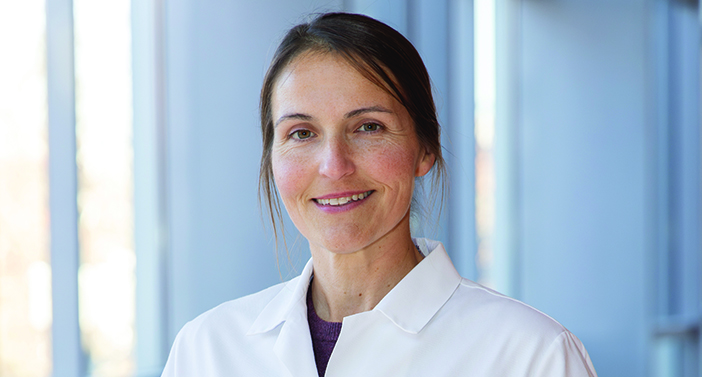Since moving from San Antonio to Providence, the new director of the Alzheimer’s center is building new research and clinical collaborations.
When Brown first tried to recruit Bess Frost, PhD, to lead the Center for Alzheimer’s Disease Research a year ago, she wasn’t sure she was ready to leave the University of Texas Health Science Center at San Antonio. Her busy lab there investigated the causes of brain aging and neurodegeneration, and she was in the middle of a promising clinical trial.
But the research happening up north intrigued her. In fact, a significant part of her work was based on findings that came out of Brown. The multidisciplinary nature of the research on campus attracted her too. In July, she became the Salame-Feraud Director of the center.
“Just as I had hoped,” she says, she’s already interacted with many scientists in other fields, which “has given my team and I new ideas for projects and made us think about certain experiments in a different way.”
Frost, who studies how tangles of tau protein in the brain—one of the signature diagnostic features of Alzheimer’s—affect cellular function, discovered that these pathological forms of tau can activate retrotransposons, abundant virus-like DNA sequences in the human genome. That finding follows on the research of Stephen Helfand, MD, vice chair of neurology, and John M. Sedivy, PhD, director of Brown’s Center on the Biology of Aging, who have made foundational discoveries related to the activation of retrotransposons in the context of aging.
“I was thrilled to come where some of the original discoveries on retrotransposons and aging had been made that inspired our work,” says Frost, a professor of molecular biology, cell biology, and biochemistry.
Retrotransposons have similarities to retroviruses like HIV, and in fact, Sedivy, Helfand, and other researchers—including Frost—have been testing antiretroviral drugs to see if they block retrotransposons’ effects. Frost recently completed a phase 2A clinical trial testing an HIV drug in people with mild cognitive impairment, with “encouraging results”; she’s now seeking funding for the next phase of the trial.
Key to this effort is her collaboration with clinicians like Edward “Ted” Huey, MD, who helps her lead the center as its associate director. As the director of the Memory and Aging Program at Butler Hospital, he conducts clinical trials and observational studies related to Alzheimer’s disease, frontotemporal dementia, and other neurodegenerative disorders.
“We’re happy to test treatments, but we’re not going to develop them ourselves, as we are a clinical program,” says Huey, the Martin M. Zucker Professor of Psychiatry and Human Behavior. “We’re reliant on basic and translational scientists like Bess to identify the promising therapeutic candidates that then can be tested. And when therapeutic candidates are identified, as a clinical research program we can tell them, are they safe? Are they efficacious? All of those kinds of questions.”
Frost says partnering with Huey and other clinicians at Brown’s affiliated hospitals make her work particularly fulfilling.
“I never met anyone with Alzheimer’s disease throughout my PhD and postdoctoral training,” Frost says. “It’s really important for basic scientists to interface with clinicians so that we actually interact with people affected by the diseases we study. When you think about people as people and talk with their caregivers and doctors, it gives basic scientists a different perspective.”




